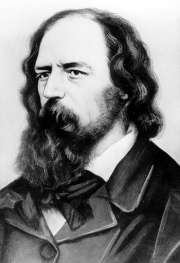|
Biography Lord Alfred Tennyson
Alfred Tennyson, 1st Baron Tennyson, FRS (6 August 1809 – 6 October 1892) was Poet Laureate of the United Kingdom and remains one of the most popular poets in the English language.
Tennyson excelled at penning short lyrics, including "In the valley of Cauteretz", "Break, break, break", "The Charge of the Light Brigade", "Tears, idle tears" and "Crossing the Bar". Much of his verse was based on classical mythological themes, although In Memoriam A.H.H. was written to commemorate his best friend Arthur Hallam, a fellow poet and classmate at Trinity College, Cambridge, who was engaged to Tennyson's sister, but died from a cerebral hemorrhage before they were married. Tennyson also wrote some notable blank verse including Idylls of the King, Ulysses, and Tithonus. During his career, Tennyson attempted drama, but his plays enjoyed little success.
Tennyson wrote a number of phrases that have become commonplaces of the English language, including: "Nature, red in tooth and claw", "'Tis better to have loved and lost / Than never to have loved at all", "Theirs not to reason why, / Theirs but to do and die", "My strength is as the strength of ten, / Because my heart is pure", "Knowledge comes, but Wisdom lingers", and "The old order changeth, yielding place to new". He is the second most frequently quoted writer in The Oxford Dictionary of Quotations, after Shakespeare.
In the spring of 1831, Tennyson's father died, requiring him to leave Cambridge before taking his degree. He returned to the rectory, where he was permitted to live for another six years, and shared responsibility for his widowed mother and the family. Arthur Hallam came to stay with his family during the summer and became engaged to Tennyson's sister, Emilia Tennyson.
In 1833, Tennyson published his second book of poetry, which included his well-known poem, The Lady of Shalott. The volume met heavy criticism, which so discouraged Tennyson that he did not publish again for 10 more years, although he continued to write. That same year, Hallam died suddenly and unexpectedly after suffering a cerebral haemorrhage while on vacation in Vienna. Though scholars are mostly of the view that Tennyson's friendship with Hallam was close but platonic, some have questioned the nature of the relationship. There is no dispute, however, that Hallam's sudden death in 1833 had a profound impact on Tennyson, and inspired several masterpieces, including In Memoriam A.H.H., a long poem detailing the 'Way of the Soul'.
Tennyson and his family were allowed to stay in the rectory for some time, but later moved to Essex. An unwise investment in an ecclesiastical wood-carving enterprise soon led to the loss of much of the family fortune. He then moved to London.
After William Wordsworth's death in 1850, Tennyson succeeded to the position of Poet Laureate, which he held until his own death in 1892, by far the longest tenure of any laureate before or since. He fulfilled the requirements of this position by turning out appropriate but often uninspired verse, such as a poem of greeting to Alexandra of Denmark when she arrived in Britain to marry the future King Edward VII. In 1855, Tennyson produced one of his best known works, "The Charge of the Light Brigade", a dramatic tribute to the British cavalrymen involved in an ill-advised charge on 25 October 1854, during the Crimean War. Other esteemed works written in the post of Poet Laureate include Ode on the Death of the Duke of Wellington and Ode Sung at the Opening of the International Exhibition.
Statue of Lord Tennyson in the chapel of Trinity College, Cambridge.Queen Victoria was an ardent admirer of Tennyson's work, and in 1884 created him Baron Tennyson, of Aldworth in the County of Sussex and of Freshwater in the Isle of Wight. Tennyson initially declined a baronetcy in 1865 and 1868 (when tendered by Disraeli), finally accepting a peerage in 1883 at Gladstone's earnest solicitation. He took his seat in the House of Lords on 11 March 1884.
Tennyson's life at Freshwater features in Virginia Woolf's play of the same name, in which Tennyson mingles with his friend Julia Margaret Cameron and G.F.Watts. He was the first English writer raised to the Peerage. A passionate man with some peculiarities of nature, he was never particularly comfortable as a peer, and it is widely held that he took the peerage in order to secure a future for his son Hallam.[citation needed] Recordings exist of Tennyson declaiming his own poetry, which were made by Thomas Edison, but they are of understandably poor quality. These were made in the last few years of Tennyson's life and include recordings of The Charge of the Light Brigade, and excerpts from "The splendour falls" (from The Princess), "Come into the garden" (from Maud), "Ask me no more", "Ode on the death of the Duke of Wellington", "Charge of the Heavy Brigade", and "Lancelot and Elaine".
Partial list of works
From Poems, Chiefly Lyrical (1830):
The Dying Swan
The Kraken
Mariana
Lady Clara Vere de Vere (1832)
From Poems (1833):
The Lotos-Eaters
The Lady of Shalott (1832, 1842)
From Poems (1842):
Locksley Hall
Tithonus
Vision of Sin
The Two Voices (1834)
"Ulysses" (1833)
The Princess (1847)
"Tears, Idle Tears"
In Memoriam A.H.H. (1849)
Ring Out, Wild Bells (1850)
The Eagle (1851)
The Sister's Shame
The Charge of the Light Brigade (1854) - an early recording exists of Tennyson reading this
Maud (1855/1856)
Enoch Arden (1862/1864)
Flower in the crannied wall (1869)
The Window - Song cycle with Arthur Sullivan. (1871)
Harold (1876) - began a revival of interest in King Harold
Idylls of the King (composed 1833-1874)
Locksley Hall Sixty Years After (1886)
Crossing the Bar (1889)
The Foresters - a play with incidental music by Arthur Sullivan (1891)
Now Sleeps the Crimson Petal - it appeared as a song in the film Vanity Fair, with musical arrangement by Mychael Danna
|




